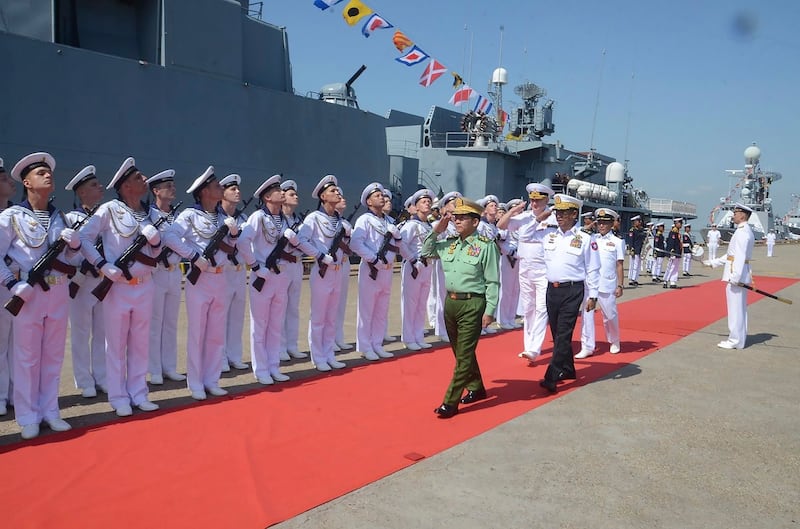Myanmar’s junta and the Russian military are conducting a three-day joint military drill in the Andaman Sea – the first joint navy drill between the two countries amid widespread international condemnation and isolation facing both countries.
The maritime exercises began Tuesday and are scheduled to conclude on Thursday. The drills have included live firing as well as underwater, aerial and surface exercises, according to military media reports.
The training is the latest collaboration between Russia and Myanmar’s military regime, which seized power in a Feb. 1, 2021, coup d’etat and has been embroiled in a civil war primarily against the democratically elected government it ousted.
Junta chief Sr. Gen. Min Aung Hlaing has visited Russia three times, purchasing modern Russian-made jet fighters, helicopters and military equipment. The two countries have also signed an agreement to build a small-scale nuclear reactor in Myanmar.
In May, a report from United Nations Special Rapporteur for Myanmar Tom Andrews identified US$406 million in arms sales from 28 Russian entities since the coup.
Three Russian destroyers and 800 sailors are taking part in the drills, which are being conducted near Myeik township in southern Myanmar’s Tanintharyi region. The narrow region, sandwiched between Thailand and the Andaman Sea, is the seat of the junta’s Coastal Region Command.

Myanmar’s navy issued a warning last week that all ships, cargo vessels and fishing boats were restricted within a 8-kilometer (5-mile) radius of the exercise area. Aircrafts were also advised not to fly below an altitude of 4,500 meters (15,000 feet), according to the junta-controlled state media.
Before the exercises, Russian ships visited Thilawa port – Myanmar’s largest – near the commercial capital of Yangon, a junta statement said.
RFA couldn’t immediately reach junta spokesman Maj. Gen. Zaw Min Tun for comment on the drills.
Russia’s support for junta
The junta organized the military exercises to show it has the backing of a powerful country, political commentator Than Soe Naing said.
“The military council is trying to lie to the world that they have support from the international community and that they are cooperating with other countries,” he said.
But the exercises also benefit Russia, which like the junta has faced international condemnation following its 2022 invasion of Ukraine, according to Aung Myo, a defense analyst and former military officer.
Russia held joint-navy exercises with seven ASEAN nations – including Myanmar – in Indonesian territorial waters in early December 2021.
Last February, Min Aung Hlaing wrote to Russian President Vladimir Putin, saying he appreciates Russia’s support for Myanmar. The message was sent to commemorate the 75th anniversary of diplomatic relations between the two countries.
In a message sent in response, Putin said he believes the relationship between Russia and Myanmar’s junta will help the security and stability of the Asia-Pacific region.
In June, an advisory group of political parties and civil society organizations opposed to the junta condemned the Russian government's political support and continued sale of weapons to the regime.
“Russia blatantly supporting and advocating for the terrorist regime is prolonging the sufferings of the people of Myanmar,” the National Unity Consultative Council, or NUCC, said in the statement.
The NUCC includes representatives of the National Unity Government, or NUG, civil society groups, ethnic armed organizations and civil disobedience groups. The NUG is the parallel civilian government of Myanmar made up of opponents to the junta.
“We have been monitoring the joint navy exercises of Myanmar and Russia,” said Maung Maung Swe, the deputy secretary of NUG’s Ministry of Defense. “We have received information from our informants that the military council has an ammunition shortage due to its excessive uses.”
Resistance forces shouldn’t underestimate the junta while it continues to import military equipment from Russia, researcher Hla Kyaw Zaw said.
“They have stronger military power,” he said. “But we have the revolutionary army and have gained public support. This is to our advantage.”
Translated by Aung Naing. Edited by Matt Reed.
